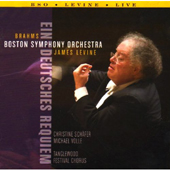
ESSENTIAL RECORDINGS

The following words by the conductor himself best describe this monumental musical creation; Brahms's German Requiem is one of the greatest works ever written.
Beyond the composer's amazing treatment of music and text, this truly extraordinary creation also holds a unique place in his output with regard to his personal life - his
feelings for Robert Schumann as mentor and friend; his love for his mother (specifically reflected in the movement with soprano solo, which Brahms added after the
premiere); his informed and very personal attitude toward Biblical text; and his longstanding and continuing interest in the music of predecessors like Bach, Handel, and
Schutz. As has been pointed out many times, this is hardly a "requiem" in the strict liturgical sense. Brahms assembled the texts himself, commenting that, despite the
language, the piece should be thought of more as a "human" requiem than a specifically "German" (vs. "Latin") one. The text overall is clearly ecumenical, something we
can all relate to, in its avoidance of specific doctrine; and the message implicit in Brahms's particular combination of words and music is not one of fear and dread, but
one of acceptance, reassurance, and consolation. James Levine
In contrast with the Verdi, Berlioz, and even Mozart requiem masses who attempt to shake a cathedral's foundation with their dark and fatalistic conceptions of death, the
Johannes Brahms requiem, on the other hand, sheds the usual liturgical text in favor of Biblical passages that seem more like prayers of hope and joys
to come. And in the musical sense, it is more like the Fauré requiem, by its use of a generally lighter orchestration (no heavy brass or thundering percussion), opting for
strings and just the right dose of pipe organ.
What gives this recording its edge over other fine versions, is the fact that it was captured 'live', during the opening concert for the Boston Symphony Orchestra's
2008/09 season. Live recordings have a way of capturing and transmitting a nervous energy, a collective goal by the participants, a raw enthusiasm and commitment often
lacking from studio takes. There certainly is plenty of enthusiasm and commitment here on the part of everyone involved. James Levine, who has
conducted this work many times, and has recorded it before for RCA, certainly shapes and moulds all the forces involved and sets the pace and momentum perfectly well
from start to finish. The Tanglewood Festival Chorus are in top form and display a control of dynamics and balance that is second to none, and the
female voices of the choir seem to exhibit an angelic tone that fits this work very well. The two soloists, Christine Schäfer and Michael
Volle both slip into their roles with ease and project the intent of the text and music perfectly. The SACD recording captures and conveys well the power generated
by the orchestral and choral forces in the second movement, which is the funeral march section or 'dies irae' if you may of the work, as well as all the many subtleties
within the music.
The Brahms requiem, a work firmly rooted in tradition, a work both personal and universal in its outlook, performed and captured in this live recording to ring as true
today as it did at its Leipzig premiere in 1869.
Jean-Yves Duperron